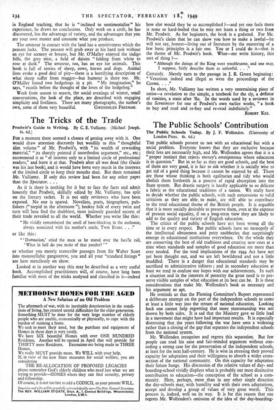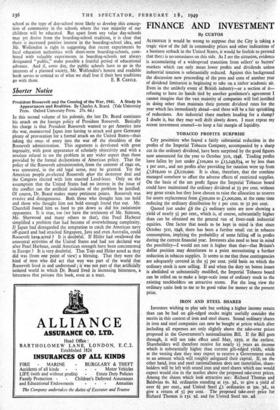The Public Schools' Contribution
THE public schools present us not with an educational bin with a social problem. Everyone knows that they are exclusive because their. fees are necessarily high, and Mr. Wolfenden agrees that it is a " proper instinct that rejects money's omnipotence where education is in question." But in so far as they are good schools, and the best of them are very good, it is fair to ask whether it is socially wise to get rid of a good thing because it cannot be enjoyed by all. There are those whose thinking is both egalitarian and tidy who would • abolish them forthwith in a process of rapid absorption into the State system. But drastic surgery is hardly applicable to so delicate a fabric as the educational traditions of a nation. We really have , to decide whether the public schools, with such concessions to valid criticism as they are able, to make, are still able to contribute to the total educational theme of the British people. It is arguable that it is more socially desirable to preserve them, even at the expense of present social equality, if on a long-term view they are likely to add to the quality and variety of English education. The critics of the public schools have 'net been wrong all the time or in every respect. But public schools have no monopoly of the intellectual obtuseness and petty snobberies that surprisingly emerge in educational institutions everywhere. On the whole they are conserving the best of old traditions and creating new ones at a time when standards and samples of good education are more than ever needed. For the total implications of the 1944 Act have not yet been thought out, and we are left bewildered and not a little muddled. -There is a danger that educational standards may be sacrificed to administrative tidiness ; and in secondary education at least we tend to confuse our hopes with our achievements. In such a situation and in the interests of posterity the great need is to pre- serve visible samples of what education at its best can be. It is these considerations that make Mr. Wolfenden's book so necessary and his argument so apt.
He reminds us that the Fleming Committee's Report represented a deliberate attempt on the part of the independent schools to come at least a little way into the stream of national education. Looking back one cannot help regretting that more statesmanship was not shown by both sides. It is sad that the Ministry gave so little lead in a movement that might have had important results. It is especially distressing that ,the years following the war have seen 'a widening rather than a closing of the gap that separates the independent schools from the national system.
Mr. Wolfenden recognises and regrets this separation. But few people can read his sane and fair-minded argument without con- ceding a strong case for the preservation of the independent schools, at least for the next half-century. He is wise in stressing their proved capacity for adaptation and their willingness to absorb a wider cross- section of the national community. On this capacity for adaptation their future hangs. His discussion of the relative values of day- and boarding-school vividly displays what is probably our most distinctive contribution to education—the conception of the school as a com- munity. Here, perhaps, more ethan in any other single direction the day-schools may, with humility and with their own adaptations, accept and develop a group of values of very great worth. This process is, indeed, well on its way. It is for this reason that one regrets Mr. Wolfenden's omission of the idea of the day-boarding- school as the type of day-school most likely to develop this concep- tion of community in the schools where the vast majority of our children will be educated. But apart from any value day-schools may yet derive from the boarding-school tradition, it is clear that there is increased positive interest in the boarding-school idea, and Mr. Wolfenden is right in suggesting that recent experiments by local education authorities with short-term boarding-schools, com- bined with- valuable experiments in boarding-schools not always designated " public," make possible a fruitful period of educational advance. And if, some day, the public schools have to go in the interests of a planned society, Mr. Wolfenden's honest and readable book serves to remind us of what we shall lose if their best traditions







































 Previous page
Previous page